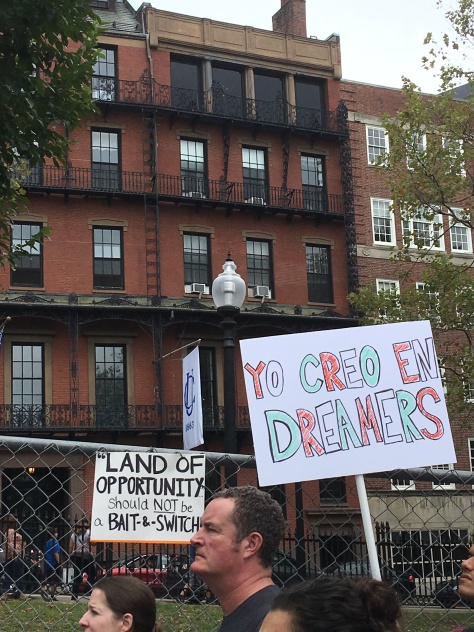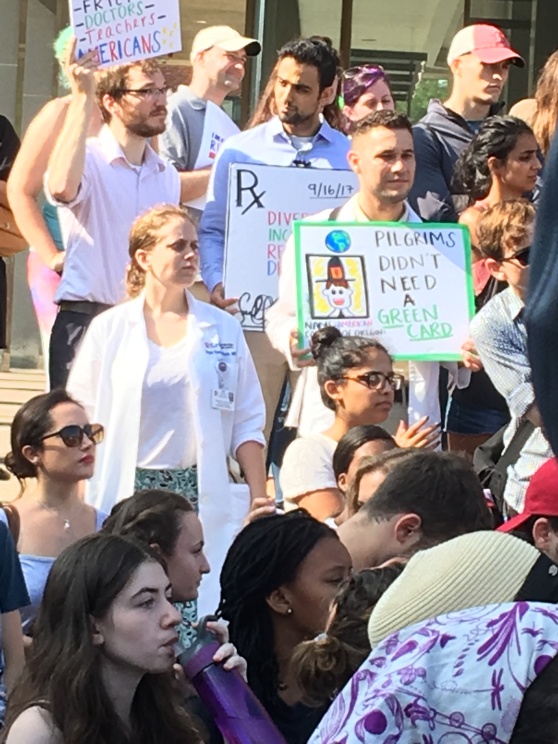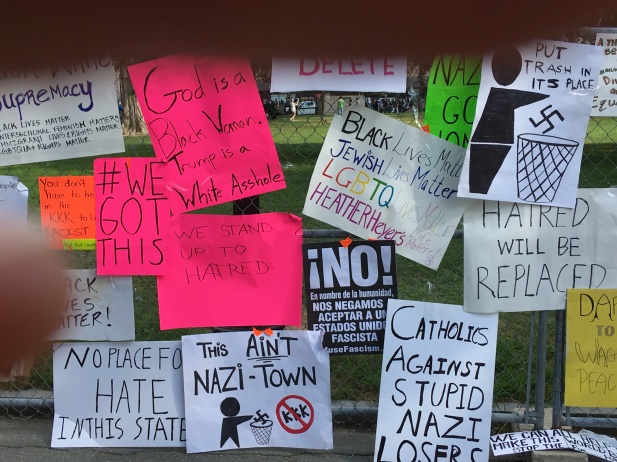I know that I have not written much on my blog since December. But a few things have happened in the last few days that have changed my thinking.
First, on Saturday, I went to the protest on Boston Common, where people rallied in front of the State House to support DACA (Deferred Action for Childhood Arrivals) and reject 44-and-a-quarter’s ending of the dreams of the Dreamers, children brought to America by their immigrant parents. It is not their fault that they are undocumented. Obama’s administration knew that. The current administration does not.
I marched because I interact with international students on a daily basis at Northeastern University and Massachusetts Institute of Technology (and, years ago, at Emerson College). I have worked at all these places with the children of immigrants. Were they legal? I have always assumed so, but the odds are that a few weren’t or aren’t. They are, as a rule, smart, motivated students who want to make the world a better place, and an American higher education will help them do that. They need us and we need them.

So I marched and chanted with friends and strangers. I took pictures of the signs I saw, and as we marched, a lot of shoppers and tourists took pictures of us. Were we entertainment? Were we an inspiration? Were we an annoyance, cutting off the road for half an hour? I don’t know.

Two days later I got a letter from an old friend, someone who has always, since I met her when she was a college freshman, wanted to have a positive impact on the world. She has always hoped to do it through her creative writing, as I have, and for several years she was very active in the movement for food justice. But the last ten months have been hard on her too.
She asked, “What does it mean to live a life of historical relevance?
What does it mean to live a life of political relevance?
What does it mean to consciously participate in this particular moment in history, in this particular time and to fall on the right side of history?
Who has done that? Who is doing it now?
And how do I fit my own existence into this particular time and place and make it as potent and transformative as possible?…
And how do ideals and pragmatic strategic viewpoints find equilibrium instead of tangling in conflict and negating one another?”
These are powerful question, to which I have no answers.
But, as I have often found, when the brain has no mooring space and cannot offer guidance, the body leads the way. After reading her ten-page letter through, I found myself rearranging the books on the shelves in my living room. I have over 900 books (not counting cartoon books and cookbooks), largely arranged by categories that can fit in a single bookcase:
Science (small)
Theology (three shelves)
Writing about Writing
Books about Books.
Cartoons
Poetry (two shelves)
Topics I Am Writing About
(My television and space for my cat to stare at me)
Popular Culture/TV
Architecture
Fiction (several shelves)
Intellectual History
Church History
Turn of the 19th/20th century History
History of World War II
Holocaust Studies
Mythology (Norse/Egyptian/Japanese)
More Theology
Medieval European History
Asian Martial Arts
Cats/Business/Classic books
Philosophy, Mainly Asian
There’s other stuff, but these are the subjects that get whole shelves in my small apartment. These are the subjects that have survived my annual cull and sell. These are the subjects that will guide you to the bits of my mind that are mappable.
I always have at least one shelf that contains books that will inform me on the current topic I am writing about or at least thinking about. Last year at this time, it included such titles as:
Bell, Quentin. On Human Finery.
Boyer, G. Bruce. True Style: The History & Principles of Classic Menswear.
Mason, Philip: The English Gentlemen: The Rise and Fall of an Ideal.
On Sunday night, I pulled out the old and replaced them with titles from other shelves:
Dorff, Elliot, N. The Way into Tikkun Olam (Repairing the World).
Gossett, Thomas F, Race: The History of an Idea.
Galbraith, John Kenneth. The Anatomy of Power.
Halberstam, Judith. The Queer Art of Failure.
Lakoff, George. Don’t Think of an Elephant!: Know Your Values and Frame the Debate.
Mandelbaum, Seymour J. Open Moral Communities.
Meinecke, Friedrich. The German Catastrophe: The Social and Historical Influences which Led to the Rise and Ruin of Hitler and Germany.
Oliver, Mary. New and Selected Poems.
Scarry, Elaine. Thinking in an Emergency.
Snyder, Timothy. On Tyranny: Twenty Lessons from the Twentieth Century.
Wallace, Max. The American Axis: Henry Ford, Charles Lindbergh, and the Rise of the Third Reich.
Zimbardo, Philip. The Lucifer Effect: Understanding How Good People Turn Evil.
Bit of a change, but difficult times lead to difficult reading, especially when contemplating having to do some difficult writing. More than half of these books are new; I got them during or after my MA in Theological Studies. But one I’ve had for a long time, and it is also the oldest. Meinecke’s book was published in 1950; I bought it in 2005. I’ve always cared about World War II and the Holocaust, although in retrospect I thought that understanding how people could come to do such horrible things was an exercise in knowledge for the sake of knowledge, not because I ever thought I would have to fight Nazism here on American soil. But as the white supremacy boiling under the surface of American national life has reared its ugly head lately, I find myself instead remembering that those who do not know history are destined to repeat it.
And as God is my witness, we are not going there again. Not here.

All of these books that now march across my Current Passion Shelf will inform the things I talk about here in the next few months. So, if you’re up for that, stick with me. If you don’t want to hear about it, that’s okay too. I will still talk about poetry, of course, and that is one reason why Mary Oliver is in a list with Galbraith, Lakoff, and Zimbardo. In the 1960s, during the fight for civil rights, feminism and an end to the war in Vietnam, protesters always sang and recited poetry. Art keeps us going when the road ahead is dark and dangerous.
All I know is that I am sick of feeling like Hamlet did in the beginning of Shakespeare’s play, when he lays out how awful things have been happening and he dare not speak of it.
He says, “But break, my heart, for I must hold my tongue” (I.ii.160).
Well, fuck that.
As Dr. Martin Luther King, Jr. said in the year I was born, “Some of us who have already begun to break the silence of the night have found that the calling to speak is often a vocation of agony, but we must speak.”
King, Martin Luther, Jr. “Beyond Vietnam.” Riverside Churh, New York. 4 April 1967. Lecture. http://kingencyclopedia.stanford.edu/kingweb/publications/speeches/Beyond_Vietnam.pdf. Accessed 19 Sept. 2017.
I’m in for the ride, Susan. Have had much the same feelings since last November. Looking forward to what you say.
LikeLiked by 1 person
Thanks for your support! There is a lot to say about all of this mess and it has taken me this long to have the courage or intestinal fortitude to begin to say any of it.
LikeLiked by 2 people
It is most definitely a mess. I wonder and hope about our ability to emerge intact from it.
LikeLiked by 1 person
There’s a lot to ponder here, and I intend to do that before making any substantive comments. But I want to admire your book categories, as they overlap substantially with mine, even though our pathways have, I believe, probably been very different. So here’s to science, theology, history, fiction and poetry, among other things!
LikeLike
Are you familiar with LibraryThing.com? It is an online book cataloguing software and it is genius. You can compare your library to other people’s and connect with them. YOu should check it out!
LikeLiked by 1 person
Thanks, it looks interesting. Maybe I see a winter’s task ahead!
LikeLike